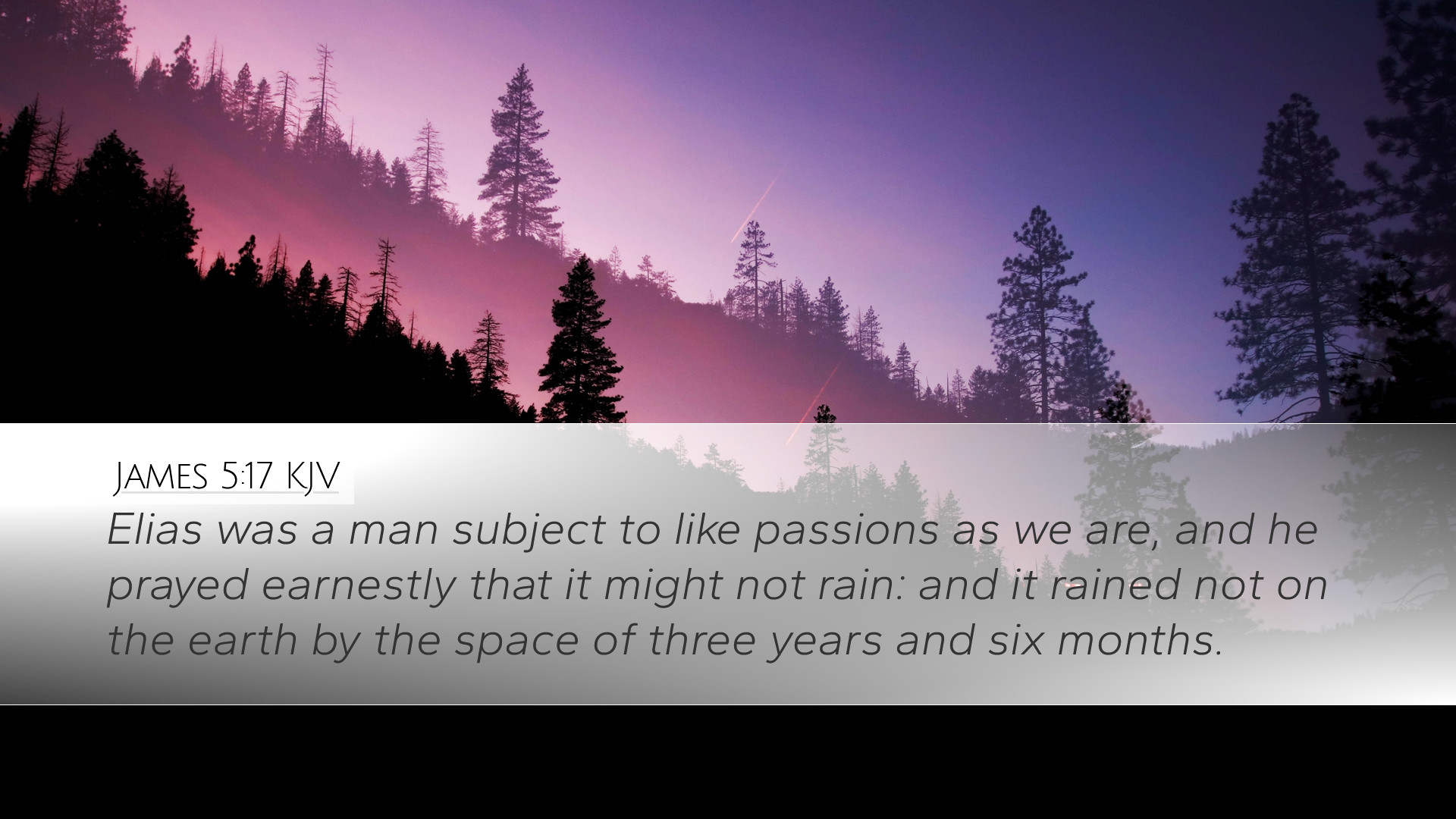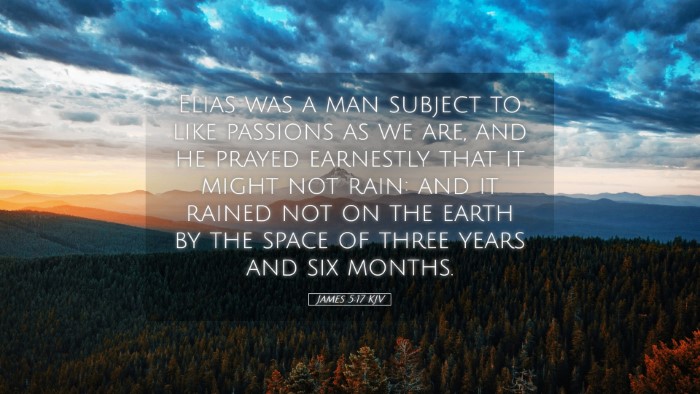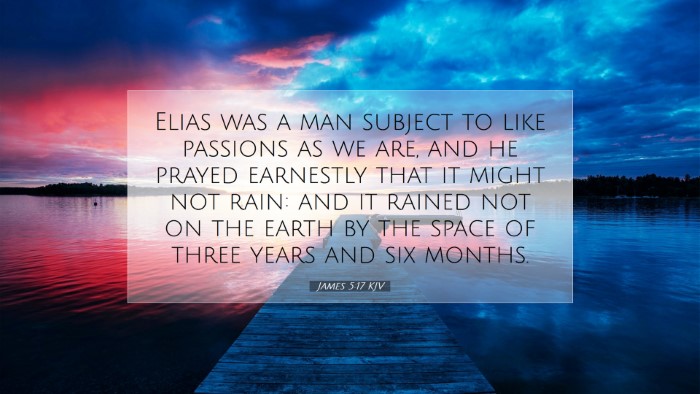Old Testament
Genesis Exodus Leviticus Numbers Deuteronomy Joshua Judges Ruth 1 Samuel 2 Samuel 1 Kings 2 Kings 1 Chronicles 2 Chronicles Ezra Nehemiah Esther Job Psalms Proverbs Ecclesiastes Song of Solomon Isaiah Jeremiah Lamentations Ezekiel Daniel Hosea Joel Amos Obadiah Jonah Micah Nahum Habakkuk Zephaniah Haggai Zechariah MalachiJames 5:17
James 5:17 KJV
Elias was a man subject to like passions as we are, and he prayed earnestly that it might not rain: and it rained not on the earth by the space of three years and six months.
James 5:17 Bible Commentary
Commentary on James 5:17
Verse Reference: James 5:17 - "Elias was a man subject to like passions as we are, and he prayed earnestly that it might not rain: and it rained not on the earth by the space of three years and six months."
Introduction
This verse from the Book of James highlights the effectual nature of prayer through the example of Elijah. By drawing attention to Elijah's humanity and his powerful praying, James encourages believers to engage earnestly in prayer.
Contextual Background
The letter of James is written to Jewish Christians facing persecution and practical challenges in their faith. It strongly emphasizes the necessity of living out one's faith through actions, with prayer being a crucial component of a believer’s life.
Historical Insights
Elijah, a prophet in the northern kingdom of Israel during the reign of King Ahab, faced significant opposition. His earnest prayer led to divine intervention in a time of spiritual decline, demonstrating how fervent prayer can invoke God’s power in challenging situations.
Commentary Analysis
1. Elijah’s Humanity
Matthew Henry notes, "Elias was a man subject to like passions as we are." This highlights that Elijah was not a superhuman figure; he experienced the same emotional struggles and challenges as any believer. This serves as an encouragement that God uses ordinary people for extraordinary purposes.
2. The Essence of Prayer
Albert Barnes emphasizes the importance of "prayed earnestly." The Greek term used implies a fervent and persistent approach to prayer. This fervency is linked to a true faith and heartfelt desire for God’s will to be done. Hence, the quality of prayer is essential, not just the act itself.
3. The Impact of Prayer
Adam Clarke elaborates on the implications of Elijah's prayer, noting that through prayer, he was able to control the natural elements, which showcases God's sovereignty over nature. Clarke indicates that prayer has immense power; it works in accordance with God’s will and purpose. Thus, the verse reinforces the notion that prayer can effect significant change.
4. Duration of the Drought
The mention of "three years and six months" connects to the account found in 1 Kings 17-18, signifying prolonged judgment and a test of faith for Israel. This quantification shows God's serious response to the apostasy of the people. It also serves as a reminder of God's timing in response to prayer, emphasizing patience in faith.
Theological Implications
James 5:17 teaches that God operates within the context of human prayer. The divine-human interaction through prayer is fundamental in understanding God's work in the world.
- Affirmation of Prayer's Importance: Believers are called to pray earnestly, reinforcing the relational aspect between God and humanity.
- Encouragement to the Faithful: Elijah's example serves to motivate believers that their prayers can be potent, despite their weaknesses.
- Understanding God’s Sovereignty: God’s responses to prayer are part of His sovereign plan, reminding believers that they must align their requests with His will.
Applications for Today
In practical terms, this verse encourages pastors, students, and theologians alike to take prayer seriously. It calls for a deeper engagement with God through prayer, advocating for a lifestyle that regularly seeks divine intervention.
1. Personal Reflection
Individual believers should reflect on their own prayer life, assessing whether they approach prayer with the urgency and fervor seen in Elijah’s example. Are their prayers aligned with God’s will, and are they persistent even in the face of delay?
2. Community Engagement
Church communities should foster environments where prayer is central, creating prayer groups or gatherings that emphasize collective intercession, following the model of Elijah’s boldness in seeking God’s intervention.
3. Ministerial Practice
Pastoral leaders are encouraged to emphasize the power of prayer in their teachings and to demonstrate it through their own lives. Their example of earnest prayer can inspire their congregations to engage deeply with God.
Conclusion
James 5:17 serves as a profound reminder of the power and significance of prayer. By reflecting on Elijah’s example, believers are encouraged to pray fervently, recognizing that God uses their earnest prayers to bring about His will on Earth. The call to action is clear: engage earnestly in prayer, for the effectual prayer of the righteous can achieve much.


